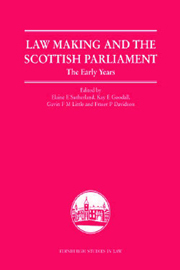Book contents
- Frontmatter
- Contents
- Preface
- List of Contributors
- Table of Cases
- Table of Westminster Statutes
- Table of Scottish Parliament Statutes
- Table of Westminster Statutory Instruments
- Table of Scottish Statutory Instruments
- THE SCOTTISH PARLIAMENT – ITS GENESIS AND OPERATION
- RIGHTS AND SOCIETY
- PUBLIC ADMINISTRATION AND SERVICES
- JUSTICE AND LEGAL SYSTEM
- 10 The Reform of the Scottish Judiciary
- 11 Criminal Law and Criminal Justice: An Exercise in Ad Hocery
- 12 Juvenile Offending: Welfare or Toughness
- 13 Evidence
- ECONOMY AND ENVIRONMENT
- Index
11 - Criminal Law and Criminal Justice: An Exercise in Ad Hocery
from JUSTICE AND LEGAL SYSTEM
Published online by Cambridge University Press: 05 September 2013
- Frontmatter
- Contents
- Preface
- List of Contributors
- Table of Cases
- Table of Westminster Statutes
- Table of Scottish Parliament Statutes
- Table of Westminster Statutory Instruments
- Table of Scottish Statutory Instruments
- THE SCOTTISH PARLIAMENT – ITS GENESIS AND OPERATION
- RIGHTS AND SOCIETY
- PUBLIC ADMINISTRATION AND SERVICES
- JUSTICE AND LEGAL SYSTEM
- 10 The Reform of the Scottish Judiciary
- 11 Criminal Law and Criminal Justice: An Exercise in Ad Hocery
- 12 Juvenile Offending: Welfare or Toughness
- 13 Evidence
- ECONOMY AND ENVIRONMENT
- Index
Summary
INTRODUCTION
At the time of writing the Scottish Parliament has passed 147 statutes, more than a third of which affect criminal procedure, sentencing, or the substantive criminal law. Such is the extent of these changes that this chapter can do no more than highlight some of the main provisions and offer some critique. Prior to the re-establishment of the Scottish Parliament, Scots criminal procedure had frequently been amended by legislation, and it is unsurprising that this has continued post-devolution. While many of the changes have been highly successful, it may be suggested that we have moved further along the spectrum from a largely adversarial process to one which now bears a greater number of features of an inquisitorial system – often in the name of “managerial efficiency”. Whether or not one favours the changes that have been made to criminal procedure, these have at least been based largely on the recommendations of commissions, established by the Scottish Executive and chaired by senior members of the judiciary. The same cannot be said for the substantive law, which has frequently been amended, and new offences created. The Westminster Parliament was often castigated for failing to find time for Scottish legislation, and there were hopes that devolution would lead to consolidation of the statutory criminal law, and possibly even codification of the common law. Devolution has created the ideal opportunity for a re-assessment of our criminal law, but there is little evidence that this is being attempted in any systematic fashion.
- Type
- Chapter
- Information
- Law Making and the Scottish ParliamentThe Early Years, pp. 208 - 224Publisher: Edinburgh University PressPrint publication year: 2011



